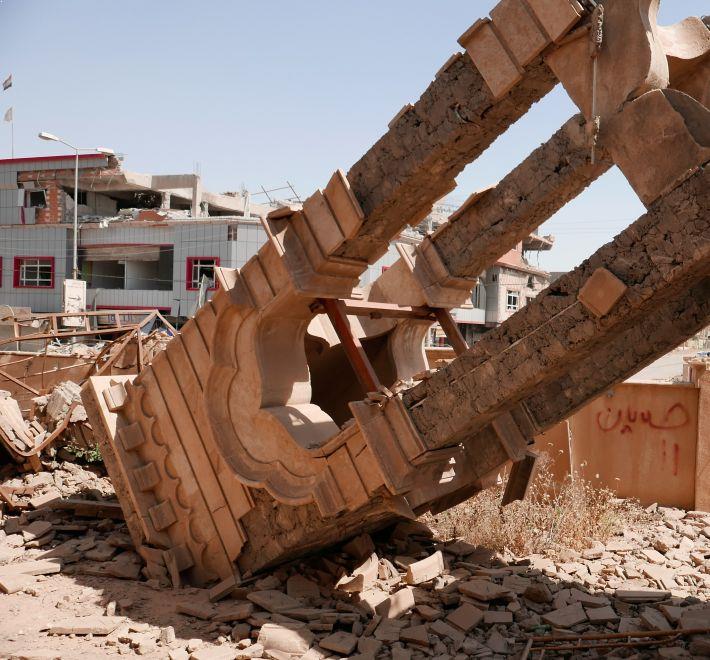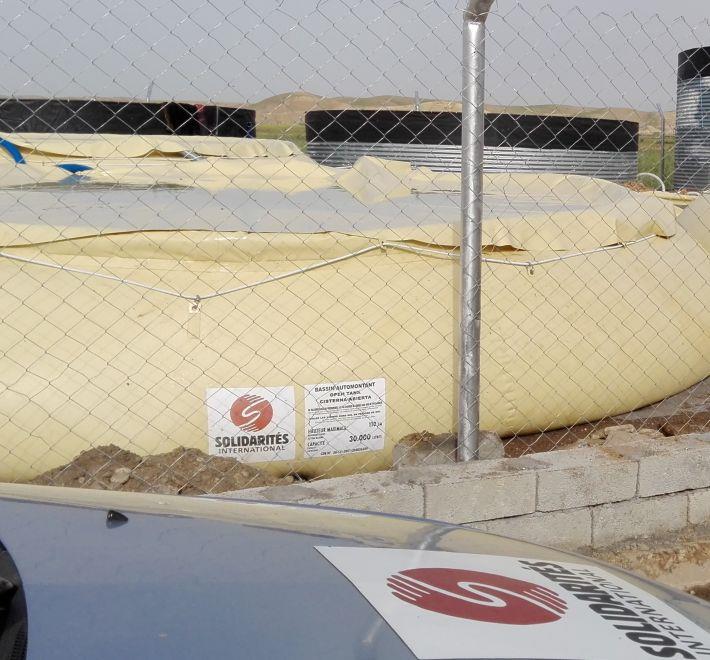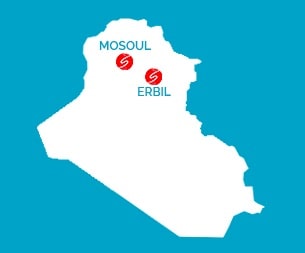INTERVIEW Edouard Lagourgue, president of SOLIDARITÉS INTERNATIONAL, went to meet our teams in Mosul, still besieged, where they provide tens of thousands people with drinking water.
Meeting with our teams
I went on the ground to meet our teams. I travelled from Erbil to Mosul. The landscape there is destroyed. Villages have been emptied of residents, ghost spaces, churches with destroyed towers, burnt and ruined houses… are quiet witnesses of past violence. As if coexistence between Sunnis, Shia, Yezidis and Christians had been willingly obliterated. I know these people from my long humanitarian experience in this region. Along the road, close to Mosul, refugees from the city and the battered surrounding villages are living in camps. In Mosul the siege started in October and was still going on in the western part of the city when I was there, after the Islamic State organization took back the east of the city in February.
Our actions in Mosul are the heart of needs and the very essence of SOLIDARITÉS INTERNATIONAL’s mission. They respond to emergency needs: access to drinking water.

Who can do without a single glass of water when it is 40 degrees in the shade?
Along my journey I met professional, committed and efficient teams. Their mission is to help people who need humanitarian aid and dignity. Man or Woman, Iraqi or French, they all share this need to push their limits and respond to those critical needs. They also share and follow a humanitarian vision and an incredible energy to set up easy, affordable and irreplaceable solutions to provide drinking water. Who can do without a single glass of water when it is 40 degrees in the shade?
A vital response
To the people of Mosul who have been living in fear, sorrow, chaos and constant disorder, we provide an energetic, daily, and vital response. We built a water purification station in Haman Al Alil, South Mosul, with know-how and determination, and the support of the French Foreign Ministry’s Centre de Crise et de Soutien (CDCS). Producing more than 420,000 litres of water pumped from the Tigris every day, this station provides two camps of displaced people with drinking water as well as the MSF hospital and the Wadi Hajar neighbourhood (south west of the city), not too far from the old town. The old town is still in the hands of the Islamic State [at the time of writing]. The residents are trapped there. They are reduced to eating cardboard or flour and to drinking brackish water. They cannot flee under the threat of being executed.

Increasing needs
“We must extend the scope of our action, double the number of water points!” This was the first thing our teams in charge of drinking water distributions inside Mosul told me. “We must produce more as the needs are going to increase.” Because of the destruction of the existing city network, the heat, but also because of the fact that people will want to go home (they left the neighbourhood when it was taken by the Iraqi army waiting for danger to pass) , the need is going to increase in Mosul. That is the reason why our teams in Iraq have designed a new station that they are going to settle in Abu Saïf, at the entrance of the city. In a way to be closer to Mosul, where people are in a very high need. The goal is to provide twice as more water and to cover two additional neighbourhoods.
Today, I call on an emergency mobilization to respond to a fundamental right, access to drinking water.
Deeply affected by the sorrow of those people who have been through hell, I had the chance on the ground to welcome and encourage our teams in charge of our first humanitarian response. I want to thank the fortitude of our Iraqi and French volunteers, brothers in humanity, who work relentless under a blazing sun and in this scene of horror, to pump the insalubrious water from the Tigris, treat it and provide it to more than 50,000 people. Ensuring from beginning to end a perfect and efficient distribution of vital basic relief. They deserve great admiration and I expressed our gratitude on behalf of the organisation. Today, I call on an emergency mobilization to respond to a fundamental right, access to drinking water. Because water is life and in Mosul it is a question of survival.
Iraq
Context and action- 43.5 million inhabitants
- 121st out of 191 countries on the Human Development Index
- 27.749 helped people

